Getting Familiar with the Illinois Home Repair Fraud Act – 815 ILCS 515/1

The Illinois Home Repair Fraud Act (815 ILCS 515/1-515/3) plays a pivotal role in safeguarding homeowners from fraudulent practices in the realm of home repair and construction. It establishes a legal framework that demands transparency and integrity from contractors, ensuring that home repair contracts are fair and honest.
Key Provisions of the Act
Under the Act, any home repair job exceeding $1,000 must be supported by a written contract. This contract is not just a formality; it is a detailed document that must include:
- Total Cost: A comprehensive breakdown of all charges.
- Detailed Description of Work: A clear explanation of what will be done, including materials and services.
- Timeline: A schedule outlining when the work will start and when it is expected to be completed.
- Contact Information: Details of the contractor including name, address, and telephone number.
Prohibitions Against Deceptive Practices
The Act defines “home repair” broadly, encompassing everything from fixing leaky faucets to installing central air conditioning. It also clarifies what constitutes “fraudulent practices,” such as:
- Misrepresenting experience or qualifications.
- Demanding or accepting excessive upfront payments.
- Failing to obtain necessary permits.
- Performing shoddy work or using inferior materials.
- Abandoning the project without cause.
If you suspect you’ve been a victim of home repair fraud, the Act empowers you to take action. It provides a clear legal framework for pursuing compensation, including:
- Cancellation of the contract.
- Recovery of damages, including lost wages and emotional distress.
- Fines and even jail time for the contractor.
If you experience any of the following issues with a contractor – here are six steps you should take:
- Document Everything: Start by gathering all documentation related to the project. This includes the contract, any correspondence (emails, texts, letters), receipts, and photos of the work done. Documenting the issue is crucial for any potential legal action or dispute resolution.
- Communicate with the Contractor: Address your concerns directly with the contractor. Sometimes, issues can be a result of misunderstandings that can be resolved through communication. Make sure to keep a record of these communications as well.
- Consult the Contract: Review your contract for any clauses that pertain to dispute resolution, incomplete work, or non-compliance. Understanding your contract can help determine your next steps and whether the contractor has breached the agreement.
- Seek Legal Advice: If the issue is significant, such as a large financial loss or severe project mismanagement, consult with Chicago construction attorneys. They can provide guidance based on the specifics of your situation and the laws in your area.
- Report to Authorities: If there are clear violations, such as not obtaining necessary permits or fraudulent misrepresentation, report these to the relevant local authorities.
Remember, prevention is always better than cure. Thoroughly vetting contractors, having a clear and comprehensive contract, and keeping informed about the progress of the work can help avoid many of these issues.
Homeowner Rights and Responsibilities
As a homeowner, the Act bestows upon you several rights to shield against fraud:
- Right to a Detailed Contract: You are entitled to a contract that comprehensively details the scope of the project.
- Right to Cancel: You can cancel the contract within three business days without penalty if the contract was signed at your home.
- Right to Seek Damages: If a contractor violates the Act, you have the right to pursue legal action for damages.
While the Act provides robust protections, it also places certain responsibilities on homeowners:
- Verify Contractor Credentials: Ensure that the contractor is licensed, insured, and bonded.
- Understand Your Contract: Read and comprehend all aspects of the contract before signing.
- Monitor Work Progress: Keep an eye on the work being done to ensure it aligns with
Safeguarding Your Home with Knowledge and Legal Guidance
Your home is more than just a building; it’s a significant investment and a cornerstone of your life. The Illinois Home Repair Fraud Act provides a vital protective measure against fraudulent practices in home repairs and construction. Understanding this law and exercising your rights under it are key to safeguarding your investment.
In cases where you need further assistance or face legal challenges in your home repair or construction projects, turning to Grzymala Law Offices is the smartest decision. They can provide the support needed to navigate the complexities of construction law effectively.
Remember, protecting your home begins with awareness and is fortified by professional legal guidance. Don’t hesitate to seek out the services of our Chicago construction attorney to ensure your home projects are conducted fairly, legally, and to your satisfaction. Your home deserves no less.
